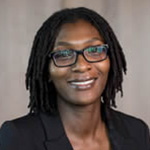Representation of African-Americans in STEM (science, technology, engineering and math) fields is low, especially among women.
Studies show that despite demonstrating high interest, African-American girls have fewer support systems, less exposure to, and lower academic achievement in STEM fields than their Caucasian counterparts.
Sheretta Butler-Barnes, PhD, assistant professor at the Brown School at Washington University in St. Louis, is working to change that.
This spring, Butler-Barnes spent many Saturdays working at the Brown School with a group of African-American middle school girls to increase interest in STEM while immersing them in their African-American cultural heritage.
Using evidence-based intervention programs, Butler-Barnes and her team helped the young women, who come from underserved school districts in north and central St. Louis, gain confidence in mathematics and science while gaining a better understanding of, and appreciation for, their culture.

Butler-Barnes also is working on an academic study of the effectiveness of this intervention.
In 2014, she conducted her first pilot study with a group of 12 African-American middle school girls titled, “Celebrating the Strengths of Black Girls Mathematics Academy.” Her work in this area builds on her 2013 study, “African American Adolescents’ Academic Persistence:
A Strengths-Based Approach.”
“When we did this program last year, our findings revealed significant gains in racial pride, achievement motivational beliefs and algebraic knowledge,” Butler-Barnes said. “However, the girls felt a disconnect between mathematics and their lived-experiences.”
Based on that knowledge, this year her team began using a curriculum called “G-Math: Culturally Responsive Curriculum,” developed by Butler-Barnes’ husband, David Barnes, a secondary certification mathematics teacher and instructor of mathematics at Harris-Stowe State University in St. Louis.
“Our hope is to increase the girls’ algebraic knowledge by using real-world content unique to their experiences,” Butler-Barnes said. “We hope that will establish a stronger connection to mathematics.”
Butler-Barnes hopes to eventually expand the program to boys and other students of color.